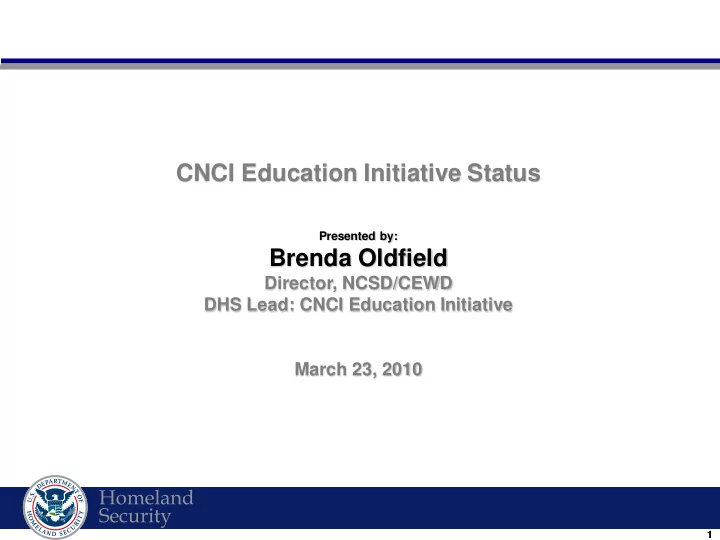

CNCI Education Initiative Status Presented by: Brenda Oldfield Director, NCSD/CEWD DHS Lead: CNCI Education Initiative March 23, 2010 Homeland Security 1
CNCI Education Initiative Status OBJECTIVE: Provide the USG with a technically adept cyber workforce capable of achieving the goals of the CNCI. With an initial focus on role-based, specialized skills of the current cyber personnel and the pipeline of future cyber recruits , this effort will expand the capabilities of today’s workforce and prepare the future USG workforce. Homeland Security 2
CNCI Cybersecurity Education Status • Education Initiative Senior Steering Committee - collaborative interagency working group assigned from civilian, intelligence, defense and law enforcement agencies. • Cybersecurity Education Partnerships - DHS to accomplish its CNCI responsibility via interagency agreements with the agencies with official responsibility and/or operational infrastructure in place to initiate and implement targeted activities. INTERAGENCY SENIOR STEERING COMMITTEE DHS & DoD/NSA, Co-Leads DOS: DS, FSI DHS: NCSD DOC: NIST DOD: NSA, DIAP, DC3 DOJ: FBI ODNI: ONCIX NSF Homeland Security 3
CNCI Education Initiative Status Strategy Addresses 3 Drivers: 1) Develop a framework for career development in cybersecurity that keeps pace with technological change 2) Create a systematic approach and common taxonomy of cybersecurity skill sets and standards 1) Accelerate the availability of skilled workers in the Federal pipeline Homeland Security 4
COMING TO A PC NEAR YOU -- SUMMER 2010 !!!!!!! IT Security Courseware and Hands-on Labs, via Virtual Training Environment (VTE) Federal Cybersecurity Training Exercise Program Homeland Security Keep pace with technological change 5
Government-wide Access to Virtual Training Environment (VTE) Deploy online, on-demand training content to Federal IT Security users (> 800 hours of role-based skills training and hands-on laboratories) Role-based skills training Hands-on laboratories Will Support >100K Federal IT security users ~20K simultaneous users Access entirely via web-browser Department of State, Foreign Service Institute: Initial setup of hosting environment and support; acquire hardware/software; C&A of platform & facility Carnegie Mellon University/Software Engineering Institute (CMU/SEI): Deliver technical and operating specifications; application and content transfer; and instructor support Homeland Security Keep pace with technological change 6
Federal Cybersecurity Training Exercise Program • Develop a framework, design model to provide attack/defend training exercises for civilian agency staff • Conduct pilot sessions using both simulations & virtual labs for active-learning experiences • Evaluate results/make recommendations for full implementation • Scope for national expansion - State/Local government Cybersecurity Education Partnership DHS/ Department of State-Diplomatic Security Training Center Homeland Security Keep pace with technological change 7
Cybersecurity Education Partnership DHS/Department of Agriculture & NDU iCollege vGOV Trusted Source Hosting Project • Federal Virtual Worlds Consortium partnership: USDA & NDU-IRM College • Promote collaboration and an interchange of expertise • Government-wide, multi-agency secure access to virtual worlds content repository • Develop prototype user cases for cybersecurity training Outcome: Proof of concept, secure environment for cybersecurity training Homeland Security Keep pace with technological change 8
Federal ‘Cybersecurity’ Skills Qualifications & Training Requirements/Standards OMB/FISMA Guidance: NIST SP 800-16: DoD IT/IA Information Systems Cybersecurity Security Training Civilian Functional Guidelines Community Management (REVISION) OPM GS 2210: DoD 8570: IT Road Map - Workforce Improvement Program: Competencies, KSAs and Commercial Certification NEED TO DEFINE Training Resources Baseline for IAM & IAT FEDERAL CYBERSECURITY WORK / ROLES: CIO Council Committee on National IT Workforce Committee: Security Systems (CNSS): IT Security, Information Security IA Training Standards Qualifications Matrix Information Assurance, (40XX Series) (Work in Progress) Computer Network Operations . . . ODNI/CHCO: Intelligence Community DHS IT Security EBK: Cyber Competency A Competency & Sub Directory Functional Framework NSA/CSS (Work in Progress) Computer Network Operations Workforce Development Plan: CNO Competency Model Red = Under Development Homeland Create a systematic approach Security 9
Interagency Cybersecurity Workforce Transformation WG Federal Cybersecurity Competency Synchronization Activity • Review existing cross-community IT security, information assurance, information security training guidelines/standards • Compare & contrast “cybersecurity” efforts currently underway in civilian, IC, and defense agencies • Determine how current federal titles, work roles, job definitions, & training activities map to the concept of “cybersecurity” OUTCOME: A flexible taxonomy of cybersecurity functions, competencies, & work activities that are typical across government Homeland Create a systematic approach Security 10
Cybersecurity Education Partnerships DHS/National Science Foundation & National Security Agency Federal Cyber Service and National Centers of Academic Excellence in IA Education Programs Establish and implement 2YRCAE Community College program 1st 6 schools designated, March 2010 Sponsored International Review of IA Curricular Standards Report published to ACM/IEEE website, December 2009 Develop CAE model for education, training and academic outreach in support of cybersecurity of the critical infrastructures Academic WG established Annual co-sponsorship: CAE/IAE and SFS programs Implement SFS Mentorship Facilitation Pilot Homeland Security Accelerate the availability - pipeline 11
Cybersecurity Education Partnership DHS/Carnegie Mellon University Software Assurance (SwA) Education & Training Products Load SwA curriculum content & training tools to the CMU/SEI Virtual Training Environment for wide dissemination to colleges/universities Homeland Security Accelerate the availability - pipeline 12
DHS CEWD Funded Sponsorships Colloquium of Information System Security Educators (CISSE) 2010 National Collegiate Cyber Defense Competition (NCCDC) and Regional CCDC Competitions Federal Information System Security Educators Association (FISSEA) Digital Forensics Educators Working Group (with FBI) State Government Information Security Workforce Development Model Homeland Security 13
Recommend
More recommend